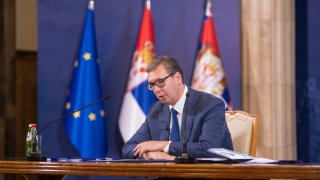Serbia is Not a Russian Ally
Belgrade’s decision to open its lithium resources to Europe indicates the future orientation of Serbian foreign policy.
The Serbian economy has a stable and irreversible link to Western technology and supply chains. Trade with EU markets accounts for 60 percent of Serbia’s total exchange of goods and services with the rest of the world, while the United States is Serbia’s largest trade partner in services. No less than 58 percent of FDI comes from the EU. According to both parameters, Russia has an almost insignificant share of Serbia's economy. Serbia's relations with the United States are based on a mutual strategic determination for Serbia to join the EU and entail very active bilateral defense and political cooperation. Most decision-makers in the U.S. government view Serbia as a “factor of stability in the Western Balkans.”
These indicators demonstrate the true nature of Serbian policy toward Russia, the EU, and the West.
In this respect, the Serbian government’s approval of the Rio Tinto project to develop the largest lithium deposits in Europe, reject China’s interest in Serbian lithium, and limit access to this critical material to the West should dispel all previous doubts about Serbia’s pro-Western course. By signing a strategic partnership agreement with the EU in the presence of German Chancellor Scholz, Serbia became a key contributor to the EU coalition on securing critical minerals, of which lithium is at the forefront. Considering that the projected annual quantities of Serbian lithium are sufficient for the production of batteries for 1.1 million cars—almost 20 percent of Europe’s annual EV production—the country will thus become a first-class European partner, which will undoubtedly accelerate its full membership in the EU.
Russia knows that it cannot offer Serbia an alternative for its national ambitions, but it does not want to give up the influence it has built up over the course of history. Its approach to Serbia is, therefore, based on myths about historical brotherhood, which it spreads through a carefully cultivated and financed network of propaganda, fake news, and intelligence activities. These channels are highly effective in engaging the Serbian public, but regrettably, for Moscow, they do not influence Serbia’s state policy.
Dr. Orhan Dragaš is a Serbian expert on security and international relations. He is the founder and director of the International Security Institute, based in Belgrade (www.isi-see.org). He is the author of numerous expert articles and newspaper columns, as well as the books The Modern Intelligence-Security Community, Utopia or Reality, Two Faces of Globalization: Truth and Deceptions, The End of the Russian World: Russia, Ukraine, Balkans, and Russia: From a Failed State to a Rogue State.
Image: Dragan Mujan / Shutterstock.com.

